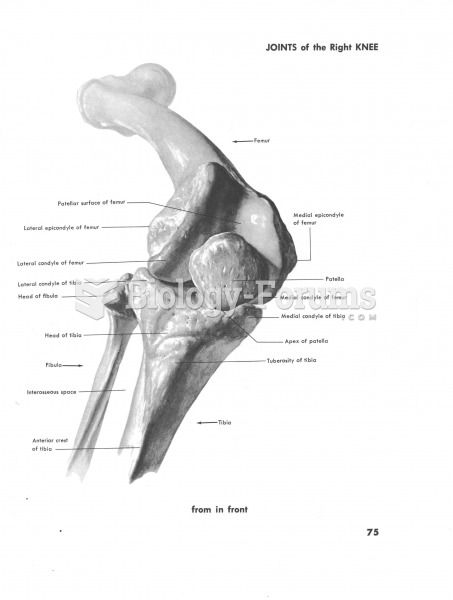Answer to Question 1
Correct Answer: 2,3
Rationale 1: The nurse should be able to answer this question.
Rationale 2: Inflammation is a symptom of an underlying disorder. The underlying cause of the problem should be identified and treated.
Rationale 3: Inflammation is a natural process for ridding the body of antigens and is usually self-limiting.
Rationale 4: Many anti-inflammatory drugs are inexpensive and are safe if used according to directions.
Rationale 5: While the client may indeed need to slow down and pay more attention to health, this statement does not answer the client's question and is confrontational.
Global Rationale: Inflammation is not a disease but a symptom of an underlying disorder. Whenever possible, the cause of the inflammation is identified and treated. Inflammation is a natural process for ridding the body of antigens, and it is usually self-limiting. The nurse should be provide teaching such as nonpharmacologic treatments such as ice packs and rest being used for mild symptoms whenever applicable. Many anti-inflammatory drugs are inexpensive and are safe if used according to directions. While the client may indeed need to slow down and pay more attention to health, stating You need to slow down and take care of your body does not answer the client's question and is confrontational.
Answer to Question 2
Correct Answer: 3,5
Rationale 1: Magnesium salicylate is pregnancy category D in the third trimester.
Rationale 2: The two drugs have salicylate in common and have similar contraindications and adverse effects.
Rationale 3: Magnesium salicylate should not be used. A different drug should be chosen.
Rationale 4: Aspirin is pregnancy class D in the third semester.
Rationale 5: Nonpharmaceutical treatment measures should be used first, as drugs should be avoided during pregnancy.
Global Rationale: Magnesium salicylate is an oral drug approved for fever and mild to moderate pain and inflammation associated with osteoarthritis, RA, bursitis, and other muscle or joint conditions. It inhibits prostaglandin synthesis just as aspirin, but it is less potent, causes less GI irritation, and has less effect on platelet aggregation than aspirin. Magnesium salicylate should not be administered to patients with known hypersensitivity to other salicylates. Other contraindications and adverse effects are similar to those of aspirin. This drug is pregnancy category C for the first and second trimesters and D for the third trimester. Nonpharmaceutical treatment measures should be used first, as drugs should be avoided during pregnancy.






